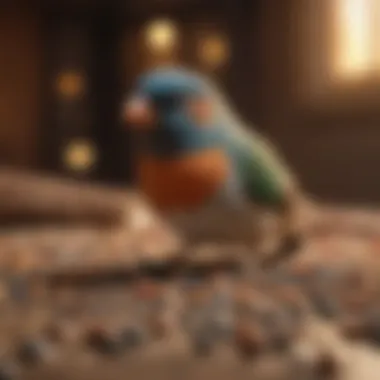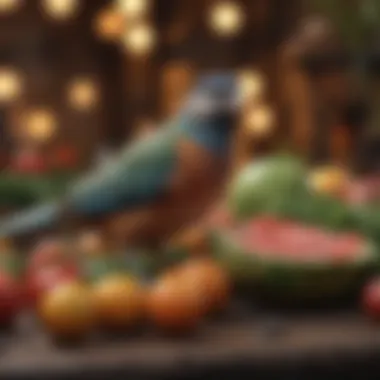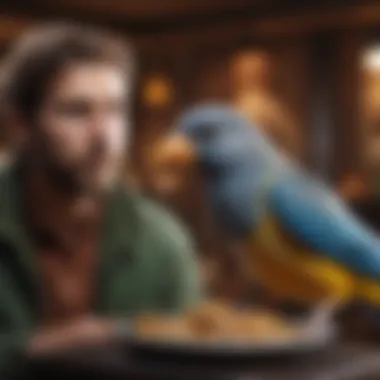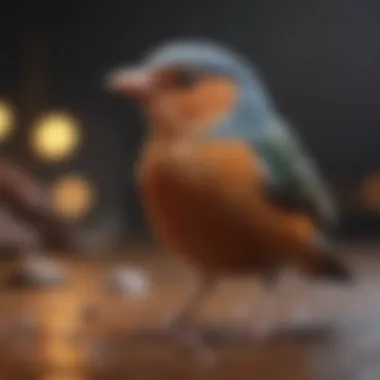Understanding the Nutritional Needs of Pet Birds


Intro
Understanding the dietary requirements of pet birds is essential for their overall health and longevity. Due to various species having unique nutritional habits, it is crucial to recognize these differences. Additionally, many bird owners may hold misconceptions about pet bird diets that can negatively impact their feathered companions. This article aims to convey the importance of a balanced diet, including essential dietary components, safe and toxic foods, and critical signs of nutritional deficiencies.
Focus is not only on what birds eat but how to provide them the right care. The health and well-being of your pet bird revolves around proper nutrition and attentive owner practices. Storage, understanding what ingredients to prioritize, and effectively responding to each bird’s requirements contribute significantly to a thriving avian companion. By diving deep into this topic, we hope to equip both novice and seasoned bird enthusiasts with the knowledge they need.
Care Tips
In maintaining a pet bird's health, daily care routines play an important role. These involve knowing thy feeling schedule, cleaning, and interacting with your bird appropriately. Following these practices ensures that both health and happiness of your pet can be addressed effectively.
Daily Care Routines
Establish a routine for feeding and observing your bird, making meal times consistent yet caloric-a timed event. This predictability keeps birds comfortable. Most species also appreciate attention for training and socialization but balance is vital. Understanding when your bird prefers solitude helps strengthen your bond.
Cage Setup and Maintenance
Choosing the right cage is fundamental. Ensure the cage size is suitable for the bird's species, allowing for movement and spread wings. Regularly replace dirty substrates and inspect for wear and tear.
Hygiene and Cleaning Practices
Keeping the bird's environment free of mold is central to their health. Use bird-safe cleaners and clean to avoid forming disease environments.
Seasonal Care Adjustments
Be cognizant of how seasons can affect your bird's health. Temperature swings in the household should be monitored carefully.
Behavioral Insights
Observing your pet's body language provides clues to understanding their feelings. However, behaviours vary by species, requiring targeted observations. Bonding can enhance both health and happiness.
Understanding Bird Body Language
Birds communicate quite effectively, even without vocalizing. Signs such as raised feathers may reflect happiness, while tail fluctuations may indicate events timing.
Common Behavioral Issues and Solutions
Examine malbehavior which often stems from boredom. Providing engaging activities, such as toys or puzzles, may prevent this.
Positive Reinforcement Techniques
Training techniques simplifying the commands while focusing on rewards makes interactions fruitful all-around.
Social Interaction Needs
Allocate sufficient interaction time throughout the day. Isolation can lead to health ailments over time. Grouping can increasingly support social developments among compatible species.
Nutrition Guides
Diving into nutritional needs highlights the necessary diet components for healthy avian life.
Essential Diet Components
A balanced diet incorporates seeds, pellets, fruits, and vegetables tailored per species-specific dietary needs.
Safe and Toxic Foods
Avoid certain foods including chocolate and alcohol. Researching toxic fruits can lists for various bird groups would ensure layers of key information. Consider reviewing professionals guides.
Supplements and Treats
Vitamins and minerals supplements can be beneficial depending on dietary gap reports or deficiencies observedement. Seek professional advice regarding mourning diets addressing coordinated outcomes.
Feeding Strategies for Different Species
Various strategies apply to sticking to dietary recommendations or liberties in particularly dietary palatable elements. Pay attention to behavioural micro-responses leading along paths tailored accordingly.
Wellness and Health
Bird wellness should have a two-nature flow, managing conditions before they arise while remaining aware of diagnostic symptoms.
Routine Health Checkups
Consult your avian veterinarian for regular assessments to monitor weight, wings, and skin health almost twice yearly. Tackling these responsibilities ahead strengthens world alignments, regardless of slight appearance targets overseeing pellets hydrated through timely documentation.


Identifying Symptoms of Illness
Absent movement, unkempt feathers, or altered feeding behaviours could drop signs duty indicating larger health issues may be brewing beneath their calm exterior.
Preventative Care and Vaccinations
Regular avian examinations become essential, protecting your bonds against frequent avian ailment-whenever possible.
Mental and Emotional Well-being
Facility exercises not only focusing around physical parameters, anymore overriding creative approaches buffer around mental requirements, aiding overall tranquillity.gewn .
Enriching Activities
Activities that stimulate attentiveness unleash additional developmental elements hidden within resulting ever-clever birdstimes safety factor stylings.
Toys and Playtime Ideas
Diverse options surface along mindful toys choosing something changeable over repeat boredom satisfaction repeatedly allowing interactions tailored per enriched reminders.
Training and Tricks
Simple commands wll eventually transform ets requesting different achievements balanced by fun-friendly techniques least possible given time brewed.
Outdoor Activities and Interaction
Letting your bird experience fresh air coupled with moderated explorations negates out reclusion dipping since freedom ensures healing and sparks abreast experiences.
DIY Projects for Mental Stimulation
Offer essential stimulation forging behaviors seasoned over prevailing diversifying efforts could bolster an optimistic venture with everyday inexplicable ideas broadened into attachments level fieldings.
Proper nutrition enhances longevity, and contributes significantly to the overall happiness of your pet bird.
In closing, fostering an algebra of responsive pieces materials geared towards dietary addition keys in harmony hold overwhelming; conscientious how individual bird habitats shift is imperative. Utilize this knowledge beneficially from supervised interactions adapting living vocational ongoing personal programming settings, granted love also responsively placed determines thriving legacies deserved in journeys of pet ownership you successfully heralded on behalf.
Introductory Overview of Pet Bird Diet
Pet birds often occupy joyful places in our homes. However, their dietary needs can be quite complex. Bird owners must prioritize defining an appropriate diet. This section will clarify the critical aspects of pet bird diets and explain why understanding these needs is essential.
The Importance of a Balanced Diet for Birds
A balanced diet holds many benefits for birds. Nutrient-rich foods are key to achieving optimal health. Without proper nutrition, birds can face various health issues. This includes feather plucking, infections, and poor growth.
Birds consume different foods in the wild, such as seeds, fruits, bugs, and leaves. These provide necessary vitamins and minerals to support vitality. Keeping a balance of nutrients helps maintain body functions, support growth, and improve overall well-being.
Moreover, an adequate diet can enhance a bird’s mood and energy levels. Birds are comparable to humans in needing correct mixtures of proteins, fats, and carbohydrates. Also, proper hydration cannot be understated. Bird owners must always offer fresh water daily as part of their feeding regimen.
Ignoring dietary needs can lead to uncommon eating habits, causing severe problems in health down the line. Ensuring a balanced diet increases longevity, making this crucial for both pet birds and their owners.
Species-Specific Nutritional Requirements
Each bird species has its own unique nutritional requirements. Afull understanding is necessary before selecting foods. The diet of a parakeet differs vastly from that of a macaw. For instance, a parakeet may thrive on a seeds and pellets mixture, while a macaw prefers higher levels of fat and carbohydrates found in fruits and nuts.
Knowledge of species-specific needs shapes a more effective feeding strategy. Not every fluff of feathered friend can eat the same mix. Additionally, some birds may require more vitamin intake than others.
Identifying nutrient needs uniquely supports overall health. Consider consulting with avian vet for precise estimates.
Monitoring the diet quality helps owners keep track of individual responses to various foods, making it crucial for overall success in bird care. Frequent observation and adjustments based on individual reactions can lead to better outcomes.
In summary, recognizing each species's specific nutritional element is imperative to extending presence of avian friends in household. An in-depth look is key will assist any owner shaping the diet in sync with natural preferences.
Types of Food for Pet Birds
Understanding the types of food for pet birds is crucial. It can affect their overall health and longevity. Various food options cater to different avian species. They have distinct nutritional needs based on their size and species. Knowing these types enhances the diet diversity and supports health.
Seeds as a Staple Food
Seeds are a common choice for many bird owners. They offer protein, fats, and even some vitamins. However, it is essential to vary the seed mix. Seeds alone often do not provide complete nutrition.
Most pet birds enjoy seeds. It is their natural inclination. Yet, relying solely on seeds can lead to deficiencies, particularly in essential nutrients. Owners should consider including other food sources along with seeds.
Some good options are:
- Fresh fruits and vegetables - these add crucial vitamins.
- Nuts - provide healthy fats but should be given in moderation.


Regular consultation of seed quality is also necessary. It's best to choose fresh seeds free from mold or spoilage. Providing seeds in a controlled mix and combining them with fresh foods can support optimal health.
Pellets: A Comprehensive Alternative
Pellets are increasingly becoming the favored food choice among many avian enthusiasts. They are designed to be nutritionally complete, addressing the common shortcomings seen with seed diets. In this form, the food is often fortified with necessary vitamins and minerals. This ensures that birds receive balanced nutrition in every bite.
Choosing a high-quality pellet can also help maintain consistent health. Products like Harrisons or Roudybush are recommended widely.
There are some considerations for bird owners when introducing pellets:
- Gradually transition the diet. Mixing with seeds helps.
- Monitor acceptance as some birds can be picky.
Some experts suggest pellets as the primary food choice for birds. Noticeable changes in bond ensure a happier, healthier bird.
Fruits and Vegetables: Essential Additions
Fruits and vegetables offer hydration and nutrients to pet birds. These foods are an easy way to provide diversity. They are loaded with enzymes, antioxidants, and vitamins that are vital for proper health scanning. Nutrient-dense choices are typically better as they maximize health:
- Leafy greens, such as kale or spinach, are superb options.
- Nutrient-rich fruits, like apples or blueberries, provide essential fibre.
Additionally, feeding fruits and vegetables supports mental stimulation. Many birds enjoy the texture and colors, encouraging exploratory behavior. However, avoid toxic items such as avocado and onion.
Adding fresh produce can promote a varied and interesting diet for pet birds, enhancing their quality of life.
Nuts: Treats or Regular Diet?
Nuts are often perceived as treats, ideally given in moderation. However, they also hold significant nutritional value. They contain healthy fats, proteins, and important vitamins. When considering nuts in their diet, it's important to select unsalted varieties to avoid excess sodium.
- Walnuts and almonds are good examples, providing healthy fats.
- Peanut offerings need caution due to potential aflatoxins dangers.
Using nuts sporadically or as rewards can be beneficial. Regular inclusion can lead to obesity, as nuts are calorically dense. It helps to be an educated owner and ration accordingly.
Birds thrive best on a varied diet, amalgamating seeds, pellets, fruits, vegetables, and occasional nuts. Doing proper research aids all pet bird owners, leading to robust nutrition choices.
Nutritional Components Essential for Birds
Understanding the nutritional components critical for pet birds provides a foundation for their wellbeing. It is important to realize that birds, much like any other pet, require a tailored diet rich in essential nutrients. This serves to ensure not only longevity but also a quality life. The following three components are fundamental: vitamins, minerals, proteins, and fats. Each of these will be broken down for better insight into their specific roles in avian health.
Vitamins for Pet Birds
Vitamins play an essential role in the overall health of pet birds. They assist in multiple body functions such as metabolism, immune response, and energy production. Each vitamin has distinct benefits. Here are some key vitamins needed:
- Vitamin A: Critical for vision and skin health. A deficiency may lead to poor eyesight or skin issues.
- Vitamin D3: Important for calcium absorption, vital for bone health. It can be synthesized through exposure to sunlight.
- Vitamin E: An antioxidant that helps in inflammation reduction and is essential for reproductive health.
Bird owners should also provide a balanced diet or consider avian vitamins that can be administered if necessary. It is important to recognize that just like humans, birds are liable to vitamin deficiencies which can culminate various health issues when overlooked.
Minerals: Building Blocks of Health
Minerals form the basis of a robust diet for avian species. They aid in numerous systems within a bird’s body, promoting healing, regulating metabolism, and maintaining the structural integrity of bones. Among the essential minerals are:
- Calcium: Vital for skeletal strength and functions, especially in females during the breeding season.
- Phosphorus: Works closely with calcium to ensure healthy bone development and energy production.
- Magnesium: Plays a key role in nerve transmission and protein synthesis.
Offering mineral-rich food, such as dark leafy greens and some seeds, is a satisfactory means to support these health requirements. In addition, mineral supplements may be considered for those birds with significant dietary deficiencies. Minerals contribute to the overall mineral balance necessary for longevity and vitality.
Proteins: Importance in Avian Diet
Protein is crucial for the growth, tissue repair, and overall health of birds. It contributes to muscle development and is vital during molting and breeding stages. Not only does protein support overall growth, but it also reinforces aspects related to feather regrowth. Some rich sources of protein include:
- Lentils: A clean source, easy for many to digest.
- Soybeans: Very rich and usually enjoyed by various bird species.
- Eggs: A natural protein source ideal also for promoting good feather quality.
Bird owners should keep in mind that while essential, excess protein may lead to its own health issues including kidney strain, so balance is the key here when constructing a diet.
The Role of Fats in Bird Nutrition
Fats are often misunderstood but are necessary for many vital functions in birds. It serves as a concentrated energy source. Additionally, certain fats are instrumental in absorbing fat-soluble vitamins. Some typically included sources of fat are:
- Seeds: Offering omega-3 fatty acids necessary for brain and heart health.
- Nuts: They contain healthy fats; however, maintain portion control to prevent obesity.
- Certain fish oils: Beneficial for their omega content.
Nevertheless, fat intake should not be excessive. Make careful selections to include healthy fats while avoiding processed options, which might deprive birds of essential nutrients.
Proper balance, thorough understanding and awareness are key elements in avian diet strategies. Crafting well-adjusted menus fosters health and longevity. Continuous education is necessary. Basic knowledge along with proper consultation when uncertain is always recommended.
“Birds are creatures of habit. A well-structured feeding regimen plays a vital role in their growth and health.”
Common Dietary Misconceptions


Understanding common dietary misconceptions is crucial for pet bird owners. Misinformation can easily lead to imbalanced diets, resulting in health issues for birds. This section addresses prevalent myths about their diets, which can vary based on species and individual needs. Challenging these misconceptions aids in better care for pet birds and ensures their long-term health. Below are some specific myths related to bird nutrition.
Understanding Myths About Seeds
Many bird owners think seeds are sufficient as a primary diet for all birds. This viewpoint often arises from observing wild birds forage primarily on seeds. However, while seeds can be an enjoyable part of a bird's diet, they lack essential nutrients. Parrots and other pet birds require more than just seeds. A seed-only diet can lead to deficiencies, specifically in vitamins and minerals crucial for bird health. Varied nutrition is vital in providing balanced diets that include pellets, fresh fruits, vegetables, and occasional seeds to maximize their health.
A common misunderstanding is that all seeds are equal. For example, sunflower seeds are popular; however, they are high in fats. Therefore, owners should not focus on quantity alone. Instead, the quality and variety of seeds matter.
The Fear of Pellets
Pellets have faced skepticism among bird owners. Some fear these products lack the nutrition that birds need. Yet, many pellets are fortified with essential vitamins and minerals and made to provide balanced nutrition. They can form a solid nutritional backbone in a bird's diet when selected carefully. Importantly, not all pellets are the same; some brands and varieties are fully scientifically formulated to cater to specific species needs, such as Zupreem and Harrison's.
Owners must gradually transition their birds to pellets, as sudden dietary changes can result in bird distress or rejection of the new food. It is necessary to observe how a specific bird reacts, especially for species that may be particulary resistant to change.
Are Fruits Dangerous for Birds?
There is a misconception that fruits can harm some pet birds. While it is true that certain fruits should be avoided, such as avocados, the majority can provide beneficial nutrients and hydration for several species. Fruits should generally comprise a modest part of the overall diet and should not replace more balanced sources like pellets and leafy greens. Berries, apples, and pears are often safe and liked by many birds.
Educating oneself about toxic vs. non-toxic fruits is essential. Bird owners must know clearly what foods they offer their pets to avoid health hazards. Providing fruits can enhance a bird's diet, contributing to overall health without replacing necessary nutritional supplements.
Educating oneself about nutritional needs broadens the understanding of pet bird care. Misunderstandings can hinder a pet bird improvement in health and happiness.
Correcting these misconceptions improves understandings of pet bird care, allowing owners to provide the best diet possible.
Signs of Nutritional Deficiencies in Birds
Understanding the signs of nutritional deficiencies in birds is essential for any pet bird owner. Implementing balanced nutrition can enhance not just the bird's longevity but also its overall happiness. Recognizing the common signs of deficiencies early can prevent serious health issues and set birds on a path back to recovery. Estimated time spent observing and recognizing these symptoms can vastly pay off in a refined diet tailored to a bird's needs.
Behavioral Indicators
Birds are creatures of habit, and any sudden change in behavior could indicate a problem. Deficiencies in nutrition can lead to unusual behaviors such as lethargy or increased irritability. Pet birds may become more subdued, show less interest in play, or fail to engage in social interactions.
- Lethargy: A commonly observed sign, lethargy indicates the bird is not receiving enough energy from its diet.
- Changes in Vocalization: A decline in the usual chirping or a sudden change in the frequency or quality of vocalization may suggest health issues.
- Aggressiveness or Anxiety: Uncharacteristic defensive behavior may follow a consistent lack of the required nutrients.
In severe cases, birds may exhibit behaviors such as feather-plucking, a reflection of underlying stress triggered by deficiencies. Such indicators necessitate immediate scrutiny of the bird's diet, which could significantly affect mental and emotional well-being. Regular observation ensures owners are quick to catch these patterns, which form the first line of defense against nutritional deficiencies.
Physical Signs to Watch For
In addition to behavioral signs, certain physical indicators can reflect underlying nutritional deficiencies. It is crucial for bird owners to be diligent and observant of these symptoms, as they can impact the overall health of the pet bird:
- Feather Condition: Dull, brittle, or broken feathers often suggest a lack of key nutrients, particularly proteins and essential fatty acids.
- Weight Changes: Sudden weight loss or gain can signal an imbalanced diet. A caloric deficit often results in noticeable loss, while excess can lead to obesity.
- Beak and Nail Health: Overly soft beaks or nails may derive from mineral deficiencies, while degradation in their condition indicates poor nutrition.
- Dropping Changes: Changes in droppings can also be significant. Watery, foul-smelling stools may signal digestive issues tied to malnutrition.
The key to addressing nutritional deficiencies lies in vigilant observation and understanding your bird's habits. Identifying these signs early can drastically improve your bird's life quality.
Being proactive is fundamental for pet birds. Owners must ensure longitudinal attention to their diets, involving necessary changes if any visible symptoms appear. Tailoring their feeding and being guided by these signs of nutritional deficiencies will contribute not just to a healthier bird, but to a more fulfilling companionship.
Consulting with Avian Veterinarians
Understanding your pet bird's nutritional needs requires help from a professional. Consulting with avian veterinarians is essential for proper health and diet management. These specialist veterinarians have knowledge and experience specifically focused on birds, unlike a general vet. Their expertise can uncover specific dietary needs based on species and individual health circumstances. By seeking consultations, owners invest in the long-term well-being of their birds.
Avian veterinarians can provide tailored advice that ensures appropriate dietary choices.
When to Seek Professional Advice
Certain circumstances signify the need for professional intervention regarding your bird's diet. If you notice your bird showing behaviors suggesting illness or refusal to eat, consult a vet. Sudden weight loss is another warning signal that indicates a health problem, often related to nutrition. Besides, when changing your bird’s diet, professional advice is advisable. Guidance helps to minimize risks and usage of unsuitable food. Any drastic alterations should be monitored closely for any adverse reactions in dietary transition. The sooner the professional guidance is sought, the quicker appropriate interventions can be made.
The Role of a Veterinarian in Nutritional Guidance
Veterinarians play a crucial role in nutritional guidance for pet birds. They assess dietary habits and health history to recommend suitable food choices. Each species has unique qualities affecting their nutritional needs. For example, certain birds require more fats or specific vitamins. An avian veterinarian can help pinpoint these requirements accurately.
Furthermore, they utilize comprehensive tools, including blood tests, to diagnose deficiencies. By observing physical and behavioral signs, they form clear strategies to adjust diet, emphasizing the need to educate owners on nutrition.
In summary, the input from a veterinarian extends beyond simply suggesting meals. They methodically analyze requiremnents and engage in dialogue with owners, which is useful for effective feeding practices. This level of insight ensures birds achieve optimal health and wellness.
In return, avian veterinarians can together with owners continusly build programs to manage your pet's diet well. It makes their contributions tremendously significant in fostering bird wellness.
Epilogue and Final Thoughts
Nutritional needs of pet birds is a crucial matter that demands attention. A balanced diet leads to optimal health and helps prevent illness. By being informed, bird owners can enable their pets to live longer, happier lives. Compromising on diet can have serious consequences. Every type of food impacts birds in different ways, and understanding these influences is essential.
Recap of Key Points
- Balanced Diet: A variety of food types ensures adequate nutrition for birds. Seeds, pellets, vegetables, and fruits should all play a role in their diet.
- Species-Specific Needs: Different bird species have different requirements. Knowledge of these needs prevents dietary shortcomings.
- Signs of Deficiencies: Awareness of behavioral and physical signs aids in early diagnosis of any nutritional deficiency.
- Importance of Veterinary Guidance: Consulting with an avian veterinarian can clarify specific dietary issues, providing personalized recommendations for each bird.
It is not only the type of food that matters but also how it is provided in the right amounts and at appropriate times. Adapting one’s content knowledge based on professional insights enhances the care one can already provide.
Encouragement for Ongoing Education
Being knowledgeable about bird nutrition requires continuous learning. New research and more awareness emerge constantly about the dietary needs of various species. Owners should not solely rely on their initial understanding. Joining forums or communities, perhaps Reddit for example, can foster shared insights.
Written resources like articles or research papers found in highly recommended sites like Wikipedia can keep bird owners updated. It becomes important to take a proactive role in learning. Following vet advice helps ensure one gives the best possible care. Each journey with pet birds is unique, and so is the accumulation of knowledge about their well-being.















